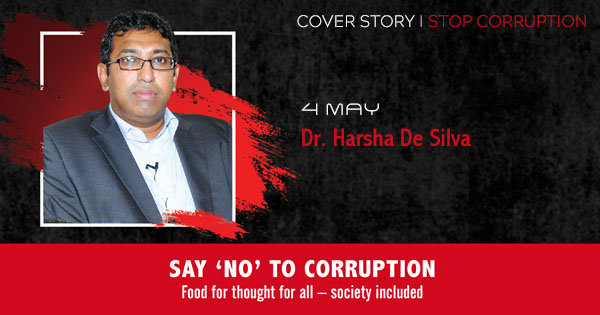STOP CORRUPTION

Five years ago in France, Emmanuel Macron broke ranks with the established parties and won the presidential election as an independent candidate. Responding to LMD’s question as to why he and others aren’t taking a cue from France, Dr. Harsha De Silva stated: “The existing political landscape and party system in Sri Lanka is still quite traditional and has built-in complexities.”
The Colombo District MP added: “Therefore, I do not think it is possible for an independent operator to go outside a political party and replicate what has happened in certain other countries.”
“I think the best way to campaign and win at a democratic election in Sri Lanka is from within a political party structure. However, in certain social segments – particularly in the city – there is a change in mindsets. Perhaps we are moving towards a more utopian state,” he deliberated.
Responding to a statement made by a leading lawyer on the preceding edition of LMDtv that all 225 MPs must go, De Silva said: “I think it is unfair to paint all 225 with the same brush because there are good parliamentarians in every party – some have completely abused their power, not declared their assets and liabilities, employed relatives in their offices and engaged in criminal activity… yet, this does not mean that everybody is corrupt.”
He spoke candidly: “Corruption is a cancer that needs to be completely eliminated – it exists from top to bottom and in every field in this country – whether it is the garbage collector who asks for an extra Rs. 200 to come every week to clear the rubbish, to the very top where colossal amounts are earned as commissions by ministers from infrastructure projects.”
“In between these levels, all kinds of people engage in many corrupt activities. I once challenged the audience at an economic forum and asked those who have never paid a bribe to the local council to stand up – only about 50 percent stood up,” he revealed.
And as he emphasised, “it is important for us to look internally and question ourselves whether we participate in corrupt activities. You cannot clap without two hands but generally, only the taker is highlighted – what about the giver?”
“How many people pay their taxes? How many lawyers and doctors are paid in cash? How many tuition teachers who teach kids about being good citizens conceal their earnings from the system?” he asked.
De Silva said emotively that “this is a societal problem. As a society, we need to be able to deal with these issues – we have to be genuine and honest about changing our mindsets, to bring about a real and lasting transformation.”
Moving on to the immediate economic crisis where bare essentials have been in short supply, the power cuts continue, and poorer segments of society are living a hand to mouth existence, he commented: “I saw this coming since mid 2020. I said it in so many ways; I spoke in English, in Sinhala, inside and outside parliament – I mentioned facts during TV debates and in newspaper interviews but no one listened.”
“I may have been the first in parliament to urge discussions with the IMF. There is a pathway out of this chaos,” he insisted, adding: “There are five things that need to happen immediately – arranging bridging finance, ensuring the banking system is stable, stabilising the macro economy, making sure there is a social safety net for the poor so they are cushioned in some way and finally, restructuring our debt – leading to massive economic reforms.”
Finally, speaking about asset declarations and independent audits becoming mandatory for MPs, De Silva explained: “The law says not just MPs but senior officials involved in public contracts should declare their assets. However, the current law does not force the person with access to such information to release it to the general public. Therefore, unless you voluntarily disclose your assets, they will not be publicly available.”




